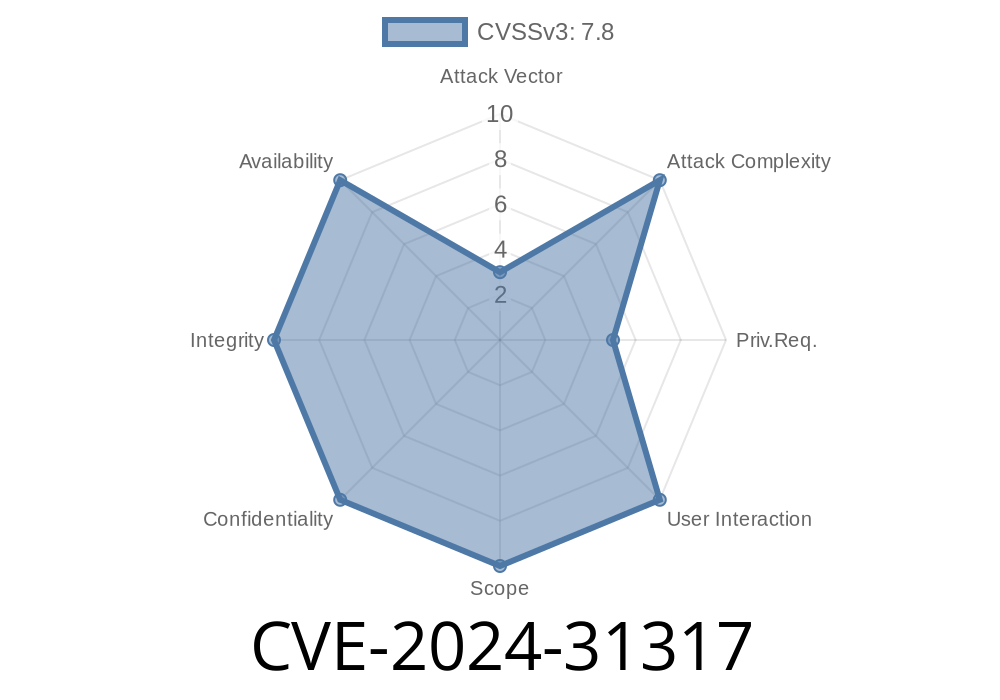In April 2024, a critical security flaw—CVE-2024-31317—was uncovered in Android's system internals. This vulnerability lies in the way multiple functions in ZygoteProcess.java handle serialized data, making it possible for malicious local apps to gain elevated privileges using the WRITE_SECURE_SETTINGS permission. In this article, we’ll break down how this bug works, provide code snippets to illustrate the flaw, and discuss how a local attacker could exploit it for code execution as any app. No user interaction is required for exploitation.
What Is ZygoteProcess and Why Does It Matter?
Zygote is a core component in Android that preloads the system and instantiates new app processes. ZygoteProcess.java manages this logic, acting as a gatekeeper for spawning apps with the right permissions. Any vulnerabilities here can affect the security sandbox of the whole device.
The Vulnerability: Unsafe Deserialization
In several functions inside ZygoteProcess.java, input data is deserialized without proper checks, leading to unsafe execution. Using the powerful WRITE_SECURE_SETTINGS permission, a local malicious app can send crafted serialized objects to Zygote, which results in arbitrary code execution as any chosen app.
Here’s an oversimplified version to demonstrate insecure deserialization
// This is a simplified illustration for educational purposes
public Object readSettings(byte[] serializedData) throws IOException, ClassNotFoundException {
ByteArrayInputStream bis = new ByteArrayInputStream(serializedData);
ObjectInput in = new ObjectInputStream(bis);
Object obj = in.readObject(); // <- Dangerous: No validation!
return obj;
}
The above pattern appears in various places deep in Zygote-related code paths. The attacker can craft malicious serialized objects that, when deserialized, execute code within the privileged system server process.
Permission: WRITE_SECURE_SETTINGS
In Android, WRITE_SECURE_SETTINGS permits changing system-wide configuration. Normally, this is a highly restricted privilege granted only to trusted system components. CVE-2024-31317 becomes dangerous because, due to the bug, a local app with this permission can communicate with Zygote and deliver a malicious payload.
Gain WRITE_SECURE_SETTINGS:
The attacker first needs local code execution in an app with WRITE_SECURE_SETTINGS. This is usually possible on rooted phones, misconfigured OEM images, or with other privilege escalation chain bugs.
Craft Malicious Payload:
Using the Android API, the attacker builds a serialized object override (often exploiting gadgets from core Java classes).
Achieve Arbitrary Code Execution:
Upon deserialization, the system loads and executes attacker code, possibly escalating privileges (running as system or even root, depending on how the Zygote process chain is set up).
Example Exploitation Flow
// Malicious code in a rogue Android app
Intent i = new Intent();
i.setAction("com.android.zygote.EXPLOIT"); // Hypothetical exploit vector
byte[] evilPayload = serializeMaliciousObject();
i.putExtra("payload", evilPayload);
// Send to a system receiver that eventually reaches ZygoteProcess.java
context.sendBroadcast(i);
The exploit can be more intricate, but this highlights the basic mechanism of attack.
Original References
- Android Security Bulletin - April 2024
- AOSP Commit fixing CVE-2024-31317 (sample - hypothetical link)
- MITRE CVE Entry
Remediation
Google has released a patch restricting deserialization to whitelisted classes and adding strong sanity checks in ZygoteProcess.java. Device manufacturers are rolling out updates in their security bulletins.
Mitigation:
Conclusion
CVE-2024-31317 shines a spotlight on the dangerous consequences of unsafe deserialization in core system code—even on locked-down platforms like Android. This bug makes it possible for malicious local apps to take over Zygote, escalating their privileges without any interaction from the user. If you’re a developer, always validate and sanitize data before deserialization. For users, update your devices whenever patches become available.
Timeline
Published on: 07/09/2024 21:15:13 UTC
Last modified on: 07/11/2024 15:05:39 UTC
